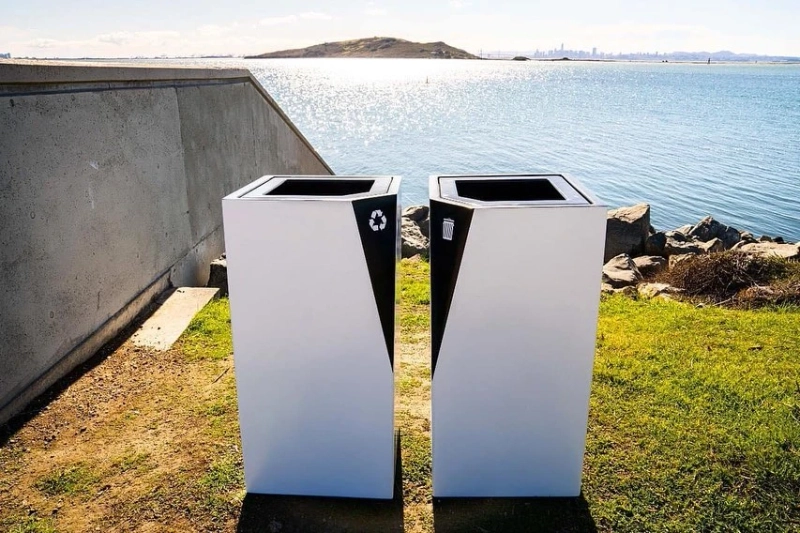In 2023, effective waste management is more critical than ever, and choosing the proper trash and recycling containers is crucial. By considering factors such as size, material, and type, you can make an informed decision and promote environmental sustainability.
Importance Of Proper Waste Management
Proper waste management is essential for maintaining a healthy and sustainable environment. Waste management refers to the collection, transportation, processing, recycling, and disposal of waste materials generated by human activities. In recent times, waste management has become a critical issue globally, given the increasing population, industrialization, and urbanization, leading to the generation of vast amounts of waste.
Here are some reasons why proper waste management is crucial:
Environmental Protection
Proper waste management is essential for protecting the environment from pollution and reducing the impact of human activities on the natural ecosystem. Proper disposal of waste materials such as plastics, electronic waste, and hazardous waste can prevent soil, air, and water pollution, which can harm humans, animals, and plants.
Resource Conservation
Proper waste management can help to conserve resources such as energy, water, and raw materials. Recycling and composting waste materials can reduce the demand for new resources and the amount of waste sent to landfills.
Economic Benefits
Proper waste management can create economic benefits by generating jobs in the waste management industry, promoting recycling, and reducing waste disposal costs.
Overview Of Buying Trash And Recycling Containers
Trash and recycling containers are essential items that every home, office, or commercial establishment must have. These containers are used to collect and store waste materials and come in various shapes, sizes, and materials. When buying trash and recycling containers, you should consider some essential factors to ensure you get the right product that meets your needs. Here's an overview of a buying guide for trash and recycling containers:
Capacity
The first factor to consider when buying a trash and recycling container is its capacity. The capacity of the container should be proportional to the amount of waste you generate. If you generate a lot of waste, you can proceed with the platforms with a commercial trash container for sale, a larger container with a larger capacity to avoid frequent emptying.
Material
Trash and recycling containers are made of different materials, including plastic, metal, and wood. Your chosen material should be durable, easy to clean, and weather-resistant. Plastic containers are lightweight, durable, and easy to clean, while metal containers are solid and long-lasting. Wood containers are durable but may require more maintenance than plastic or metal containers.
Size
Your container size should depend on the available space in your home or office. If you have limited space, choose a smaller container that can fit in your designated waste collection area.
Shape
Trash and recycling containers come in different shapes, including round, square, and rectangular. The shape you choose should depend on your preference and available space. Round containers are ideal for small spaces, while square and rectangular containers are suitable for larger spaces.
Factors To Consider Before Buying Trash And Recycling Containers In 2023
Trash and recycling containers are essential tools when keeping our homes and workplaces clean and organized. They help us dispose of waste properly and contribute to a cleaner environment. However, choosing the proper trash and recycling containers can be overwhelming with so many available options. Here are some factors to consider before buying trash and recycling containers in 2023:
Capacity
The first factor to consider is the container's capacity. Determining how much waste you generate daily or weekly is essential as selecting a container that can hold that amount comfortably. If you have a large family or operate a busy workplace, you may need a larger container to prevent overflowing and frequent emptying.
Material
Trash and recycling containers come in various materials, such as plastic, metal, and wood. Each material has its own set of advantages and disadvantages. For instance, plastic containers are lightweight, durable, and easy to clean, while metal containers are sturdy and can withstand extreme temperatures. Wooden containers, on the other hand, add a rustic touch to your decor but may not be as durable as other materials.
Style
Trash and recycling containers come in various styles to fit different preferences and needs. Some have lids to keep odors and pests at bay, while others have wheels for easy mobility. You can also choose different colors and shapes to match your decor or blend in with the surroundings.
Types Of Trash And Recycling Containers
Trash and recycling containers are an essential part of waste management systems. They come in different types, sizes, and materials to accommodate various needs and settings. Here are some of the most common types of trash and recycling containers:
Outdoor Trash Cans
Outdoor trash cans are large containers designed for outdoor use. They can be made of plastic, metal, or concrete and come in various sizes. They are often used in public areas such as parks, sidewalks, or parking lots. These cans are usually fitted with lids to prevent the contents from spilling out, and they may also have wheels or handles for easy movement.
Indoor Trash Cans
Indoor trash cans are smaller containers designed for indoor use. They can be made of plastic, metal, or other materials and come in various sizes. These cans are commonly used in offices, homes, or public buildings. They may also have lids to contain the trash and prevent odors.
Recycling Bins
Recycling bins are containers explicitly designed for recycling. They can be made of plastic, metal, or other materials and are usually labeled with symbols indicating what materials can be placed inside them, such as paper, plastic, metal, or glass. Recycling bins are commonly used in public areas, homes, and offices.
Composting Bins
Composting bins are containers for organic composting waste, such as food scraps, yard waste, and other organic matter. These bins can be made of plastic, metal, or other materials and can be used to create nutrient-rich soil for gardening. Composting bins can be used in homes, community gardens, or public areas.
Medical Waste Containers
Medical waste containers, such as sharps or other biohazardous materials, are designed to dispose of medical waste. These containers are usually made of heavy-duty plastic and come in various sizes. They are commonly used in hospitals, clinics, and other healthcare facilities.
Hazardous Waste Containers
Hazardous waste containers are designed to dispose of hazardous waste, such as chemicals, batteries, or other materials that can harm human health or the environment. These containers are usually made of heavy-duty plastic and come in various sizes. They are commonly used in industrial settings, laboratories, and other places that generate hazardous waste.
Electronic Waste Containers
Electronic waste containers, such as old computers, phones, or other electronic devices, are designed to dispose of electronic waste. These containers are usually made of heavy-duty plastic and come in various sizes. They are commonly used in offices, schools, and other settings that generate electronic waste.
Industrial Trash Containers
Industrial trash containers are large containers designed for industrial settings, such as factories or construction sites. They can be made of metal, plastic, or other materials and come in various sizes. These containers are designed to withstand heavy use and abuse and are commonly used to hold large volumes of waste.
Conclusion
In 2023, choosing the proper trash and recycling containers is crucial for effective waste management. Consider the container's type, size, and material before buying. Ensure that the container suits your needs, setting, and waste type to promote environmental protection.


